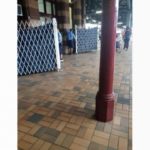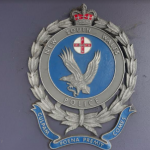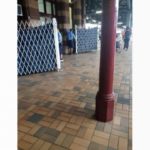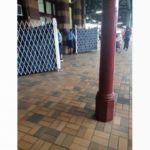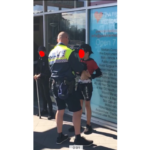NSW Police Strip Search Activists to Intimidate: An Interview With Socialist Alliance’s Rachel Evans
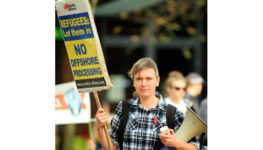
These days, a commuter disembarking at Central Station during afternoon peak hour can face the prospect of being ordered by police to step behind a screen and remove their clothes, following a positive indication from a drug detection dog.
NSW police setting up screens to conduct strip searches at Sydney’s main train station is by no means a daily occurrence. However, anti-drug dog campaign Sniff Off has reported that it’s happened more than a few times since the Berejiklian government was re-elected in March.
And it doesn’t matter if a commuter is holding drugs or not. The stats going back to 2009 show that the dogs get it wrong two-thirds to three-quarters of the time, so there are definitely citizens who don’t even take drugs being ordered to disrobe, squat and cough by uniformed strangers with guns.
As NSW Greens MLC David Shoebridge revealed last December, over the four years ending in June 2018, NSW police use of strip searches rose by 47 percent. Over 2017-18, officers conducted 5,483 strip searches statewide, while in 2014-15, 3,735 people were made to remove their clothes.
Routine harassment
The NSW police strip search powers are contained in the Law Enforcement (Powers and Responsibilities) Act 2002 (NSW), also known as the LEPRA. And over recent months, the internet has been awash with footage and reports of officers breaching these protocols.
What’s become apparent is that officers are either unsure of the correct search rules or they’re just brazenly disregarding them. Indeed, the recent music festivals coronial inquiry heard at least one instance where an officer had been using a strip search as a method to intimidate and punish.
The Redfern Legal Centre launched the Safe and Sound campaign at the end of last year, with the aim of getting the vaguely worded strip search laws in the LEPRA overhauled, as well as reducing the overuse of this highly invasive practice at events, like festivals.
Other key aspects to have emerged out of the anti-strip search dialogue is that these searches are traumatising young people, survivors of past sexual assaults are being retraumatised, and NSW police has failed to consider the long-term debilitating impacts of the procedure.
NSW: the premier police state
Socialist Alliance member Rachel Evans has been a mainstay of the Sydney protest scene since the early 90s. And just a few years back, she found herself in a police lockup being told to remove her clothes, seemingly without the attending officers actually suspecting she’d broken any laws.
Ms Evans and her fellow protester Susan Price were picked up by Newtown police on the side of the street in Redfern, after they’d left a rally on 10 November 2017, which was calling for asylum seekers detained on Manus to be brought to Australia.
Sydney Criminal Lawyers spoke to Rachel Evans about the strip search she was subjected to, the very real trauma the procedure can cause, and the importance of rallying against the overuse of strip searches by NSW police.
Firstly, in November 2017, you were on the streets of Redfern with a fellow activist, after taking part in a protest. And NSW police officers took you into custody. Rachel, what happened on the street that day?
There was a bunch of us doing sit-downs. We did a sit-down at two junctures. So, we moved up from the site where we were protesting Tony Abbott’s “make-lots-of-money re-elect me” campaign. This was at the time when Manus was politically exploding and there were actions all over the country.
We did a sit-down about 10 minutes walk from where we left off. And then we marched up into the heart of Redfern. And at the corner where Redfern police station and the train station are, we sat down and chanted.
It was very powerful, because the refugees were in a desperate situation, and there were heroic civil disobedience actions taking place across the country.
As we started to move off, we began to get kettled. The police moved to kettle us in, and so, myself and another activist, Susan Price, marched off to another area where the police weren’t as strong. They were certainly getting rough in other areas.
We were just walking to get away from police, and an officer grabbed me. Another one grabbed Susan. And they threw us into a paddy wagon.
Officers took you to Newtown police station, where you were separated from your friend. And you were strip searched. Can you explain how that came about? And what it entailed?
I asked what I was being charged with, while I was forced to wait in the van. Susan was taken out first. In the meantime, I asked the officer in front of me what we were being charged with. And he said that they weren’t sure yet. He didn’t give a definitive answer.
So, after she was strip searched, they took me into another cell. She was placed in the public holding area. I then walked into the cell and two female police officers said they were going to conduct a strip search.
At that stage, I thought they might just want me to take my top off. I had no idea that it was going to be a full body strip down. I was incredulous.
This had never happened to me before. And though I had been at rallies and protests for many years – and I had taken some civil disobedience action around refugees – the concept of being strip searched was bizarre.
I complied with taking my top off. And then they told me to take my bra off. And I protested in words. Then I took off my bra. And then they said I had to take my pants off. And I said, “Show me your policy. Why are you doing this? I want to see your policy. What gives you the right to do this?”
They threatened to bring another officer in to the cell. And I said, “I have my period.” They then backed away from demanding I take off my underwear. I took off my pants. I turned around and they frisked me.
Then I saw there was a video camera in the corner of the cell. I said, “Are you recording this? That’s not allowed. You can’t do that without my consent.”
They got me to put my clothes back on. Then I went back out to the holding cell area. They gave us back our placards and the megaphone. We asked them again what we were being charged with. And they told us nothing.
I asked the officers, “Is strip searching something you are doing now?” And they made no comment.
In your understanding, why were you and your friend subjected to such a search?
The reasoning that they are giving for strip searching people – and so many of them – are concerns around drugs, sharps, knives and weapons.
The police know me quite well, as in I’ve put in Form 1 Schedule 1’s with my name all over them for the last 10 to 15 years.
Over that time, I’ve been organising rallies in Sydney, particularly around marriage equality. I was also involved in the No to Pope coalition, of which we took the state government to court over the right to protest.
They know my name. They see it when the Schedule 1’s go in. It’s the form that you fill out to be able to march on the streets.
The police are aware that protesters with megaphones don’t hold drugs on them. So, it was an intimidation attempt.
It was a shot across the bow to us – to refugee activists and protesters more generally – “if you do protest, if you do march on the streets against government injustice, then this could happen to you”.
You said you were involved in the No to Pope coalition.
It was a famous civil liberties case, where we peacefully protested the pope, his homophobia and his anti-condom and anti-abortion position. Fifteen hundred of us marched through the streets.
Within the process of organising that rally, the state government introduced some ridiculous anti-protest laws. They were called annoyance laws. So, we went to the courts and we won the case for the right to protest.
I have been involved in protest and civil liberty campaigns throughout Sydney’s history. The police do know that we are activists, and that we are not holding drugs or weapons on us when we protest.
Were you satisfied that everything was done in the correct manner when officers searched you?
I am absolutely convinced that the police overstepped the legal mark. With the laws that pertain to strip searching, there is a lot of grey area.
There are specific parts of the legislation that clarify officers are not to touch a person. And while it’s not specified in the legislation, there’s protocol around videoing. From what I’ve read that was out of bounds.
Being touched and frisked whilst being strip searched was an abuse of powers and assault. And the thing is, we didn’t know why we were being arrested, so that’s false imprisonment under the law.
There was a whole bunch of things around how they dealt with us that breached the protocols around strip searching.
But, there’s a question about strip searching more generally, in that it is way too widespread in NSW. And having almost five and a half thousand people strip searched last year is absolutely gobsmacking.
What they are doing to the NSW population who use public transport, go to music festivals and attend protests is an abomination.
There’s been a growing campaign to bring a halt to the overuse strip searches by police. And something that’s emerged is that these searches can be quite a traumatic experience.
Can you speak a bit on the trauma and humiliation a strip search can involve?
It was traumatic. The day after, I was bedridden and in shock. I had to seek counselling over the strip search. And it took me a long time to recover mentally from it.
While I have been around protests for a very long time – and I’ve also been around people who have experienced police brutality in the Global South, with trips to Bolivia and the Philippines in particular – when I went through it myself, I was shocked.
It is very traumatic. I know two young women who experienced horrible sexual assaults when they were younger and being strip searched means that they relive those horrible experiences.
It was not an easy thing to get over. And it was incredibly humiliating and enraging to be treated in such a manner. And also enraging to find out that this is happening to so many people across NSW.
It is part of a wave of repression that the NSW state government is enacting against the population, particularly young people, but also marginalised Aboriginal communities, migrant communities and the poor.
The sniffer dog experience is also a low-level harassment of the population that can lead to more serious strip searches.
And it is on the back of the Berejiklian government being quite unpopular on a range of development issues and social questions. And that repressive way is an attempt to intimidate communities from fighting back.
Officers have periodically set up strip search screens at Central Station at peak hour to search commuters that sniffer dogs indicate. What do you think about police taking this step?
It is this harassment that they’re moving on. The statistics are so high. Almost five and a half thousand strip searches last year, and over four thousand the year before, which can really traumatise the victim.
So, there has been a conscious government shift to harassing the poorer population and young people of NSW, because the police have had to be trained in how to do this.
And now there’s a campaign against the high rates of strip searches in NSW, they’re feeling the scrutiny, yet they are still responding with high rates of strip searching and the sniffer dog campaign.
The Berejiklian government hasn’t given in to the campaign yet. And it also hasn’t given in to the campaign to stop harassment at music festivals, where a lot of the strip searching and sniffer dog harassment takes place.
So, while they are under scrutiny, the campaign has not been strong enough to reduce these numbers, which is what we would like.
And lastly, Rachel, as you’ve just mentioned, there are growing calls within the community to bring a halt to what should be a procedure of last resort being used in everyday circumstances. What do you think needs to happen here?
The Safe and Sound campaign led by Redfern Legal Centre has been really good. There’s been a public meeting with lawyers, experts, researchers and victims, who have come out and said, “Look, this has got to stop.”
The LEPRA – which is the act that enables police to strip search people – has to be tightened up. But, we really need to talk about whether we need strip searches at all.
The racism against the Muslim community, the anti-youth sentiment, the increasing homelessness and the mental stress of young workers who are casual: all of these conditions are things that make people explode.
So, we have to develop a fairer society that has the basics together: housing, education, health and cultural advancement that is not-for-profit. And we have to get rid of strip searching from the police repertoire.
So, this Safe and Sound campaign is good, because it says that police have operated outside the bounds of the legislation.
But, we also have to move in an offensive way against the police right to strip search. And that’s an important next step. So, rallies, actions and legal work.
It was really good to see a man take the government to court for strip searching and win compensation of over $100,000.
And to have public apologies from police to strip search victims that would be a step, as well as the government to come out and state that the police have been operating in an oppressive manner and say that it is going to address this.


